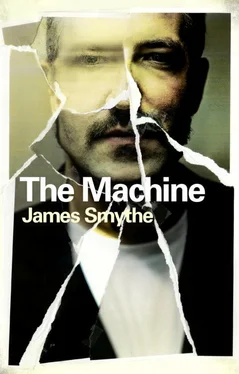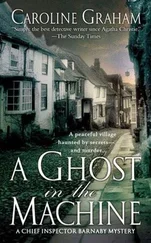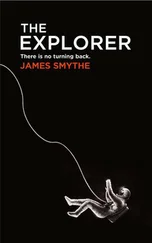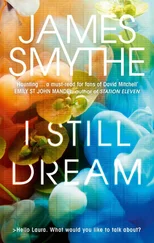So why don’t more people do this? Vic had asked.
Because it’s still a secret, the doctor told them.
Beth watches the Machine doing nothing, and it hits her that she’s done something wrong. She’s ruined it: all that money, time, thought, down the drain. She reads the instructions again, which implore her to wait. They say, It will take longer than you think. She pushes herself back onto the bed, up towards the pillows and the headboard, and she folds her legs under herself and watches it. Eventually she lies down and shuts her eyes. She thinks she’s asleep when she hears the whirring, and the familiar ding-ding-ding, and when she opens her eyes the screen is already bright with the menus.
Has it worked? she asks. She presses the information button and the screen flicks to the year, the firmware. CUSTOM, it says, instead of a number. Shit, she says. Okay. She opens the instruction sheet again, her hands shaking. Congratulations, she reads. Okay.
She flicks through the Machine’s menus again. It’s internal structure has been rearranged: where the recordings of Vic from before had been buried in a folder of their own, now they’re the only thing accessible from the MEMORY tab. She presses the button marked on, to check that the files have survived the process.
What are we doing here, Vic? asks the doctor.
We’re here to get rid of the stuff I can remember about the war, Vic says.
And how do you think it’s going.
I think it’s going. Is that enough?
At this point, yes. Absolutely.
Beth presses stop. She shuts the Machine down, and then she goes to the computer and looks at the videos of the process again, and she starts to cry. She’s so close.
The next day is hotter still. The predictions were for it to nudge up in to the high thirties, which is more and more common. Beth dresses the same, coats herself in antiperspirant. She drinks glass after glass of water to keep from dehydrating. She looks at herself in the mirror to smooth over her slightly damp brow, to push the hairs back after they’ve become sticky from the sweat on her hairline. She doesn’t care that her makeup is blotchy and matted. She swims for longer than usual, just to try and let the cold water seep into her, to try and make it somehow a part of her: to lower her temperature and allow herself to deal with the day. In her classroom, with her GCSE class, they’re going over The Tempest to set them up for the last day of term, a trip to London to see the Barrage and watch the play in the Globe theatre, but she’s lost them before they’ve even begun.
Be not afeared, she reads. The isle is full of noises.
Sounds like the new estates in Cowes, one of the boys says, and you should be well fucking afeared there, I tell you! and that gets a laugh. She tries to continue but it’s pointless; they’re in their own world for the rest of the class, and so is she. She wishes that they didn’t have the trip, but it’s routine now. Every year, the last day of term. Keeps the kids occupied, and they use what money is left of the annual budget on it, because otherwise that money is lost. Somehow most of the parents found their token monetary contribution – little more than pocket money, really – for the trip. When they give up on the book – the boys protesting about how hot it is, and how they can’t concentrate, and how the words sound invented and like lies – she tells them about the floods, and how it happened. Some of the children, Beth discovers, have never been to London.
What was it like when the floods came? asks a girl, one of the few who seem emotionally attached to what they’re doing.
It was awful; everything was ruined, and so many people lost their houses, all their things. And you know, a lot of people lost their lives.
Where were you when it happened, miss? asks one boy, one of the kids she most dislikes. One of the school’s branded troublemakers. She humours him: at least he’s paying attention to this.
I was at home, Beth says.
Did you watch it on the news?
We all did, yes. It was a really big deal. She loads up the projector (whirr, and then the background hum of a machine doing its work, she notices; doing its job), and then plays one of the files from the network. Watch this, she tells them.
The class are almost completely silent as they watch the video: there’s a bit where a naked woman, comedic in all other respects (unfit, flabby, unattractive), climbs a fence, to the top of her kitchen extension, and then scrambles, sobbing, to her roof to escape the flood; but, mercifully, none of the class laugh. The bodies of dogs and cats in the streets, floating down. The dead being dredged out onto boats. When the video ends there’s only minutes until their first class, and they leave quietly. Beth goes to lunch and sits alone, on a table at the far end. She sees Laura, who makes a beeline for her. Laura doesn’t ask to sit next to Beth – and why would she? They’re not children – but Beth finds it strange, how relaxed Laura is immediately. She starts talking about her life, how she argued with her boyfriend the previous night.
They’ve asked me to stay on permanently, she says. Apparently Mr Westlake is retiring. Something to do with his heart. She eats only salad, Beth notices. Hard-boiled eggs and crispy bacon and dressing and lettuce leaves today. She forks the food, a piece of each component in each mouthful. So I said to Rob, this is something we could do. He said that it was impractical, but we could live in Portsmouth. I could commute. He could commute. It’s a job.
What does he do? Beth asks.
He’s a plumber. Electrician. Whatever he can get his hands on. He’s a handyman, that’s the thing, but they don’t call it that any more. We have three telephone lines for all three parts of his business, can you believe that? When there are no kids nearby she leans closer. What are you doing tonight? she asks.
I shouldn’t, Beth says, not even knowing what’s coming.
Not like the other night. I’ve got a bottle of wine in the guesthouse, that’s all. You can help persuade me that moving here is a terrible idea. Rob’ll thank you for it.
I shouldn’t, Beth says. I’ve got marking to do.
Ah, the perennial excuse. Laura lowers her eyes.
I’d love to, but the work. I have to get it done before we break.
I know, I know. It’s fine. We’ll do it the last day of term or something instead.
Sure, Beth says. She watches Laura walk away and put the remaining leaves of her salad in the bin, the plate on the side.
She remembers how she used to have friends. She used to be sociable. She and Vic went to socials for the army, the wives-and-partners things, and they would sit at the tables with people that they didn’t know and they would make friends, even transitory ones who only stayed their friends for the evening. The people you could talk to and make up details about your lives, or spill secrets to, knowing that you wouldn’t have to see them again. It didn’t matter who you were for that one night. All that mattered was that, the next day, you could start again: she could wake up with Vic and never think about the people they’d met. They were young, and that was how it was for them. You sit next to somebody you barely know; ten minutes later they’re your best friend; ten hours later you struggle to remember their name, past the wine and the dancing.
Beth catches up with Laura in her classroom just before the bell rings, signalling the end of lunch.
Friday, I promise, she says. I just need to get past this stuff.
It’s fine, Laura says.
Friday we’ll go out and have more drinks.
Will there be a social thing? All the staff, something like that?
Oh God no, Beth says. Nobody does that here. Just you and me, I’d think.
Читать дальше
Конец ознакомительного отрывка
Купить книгу










